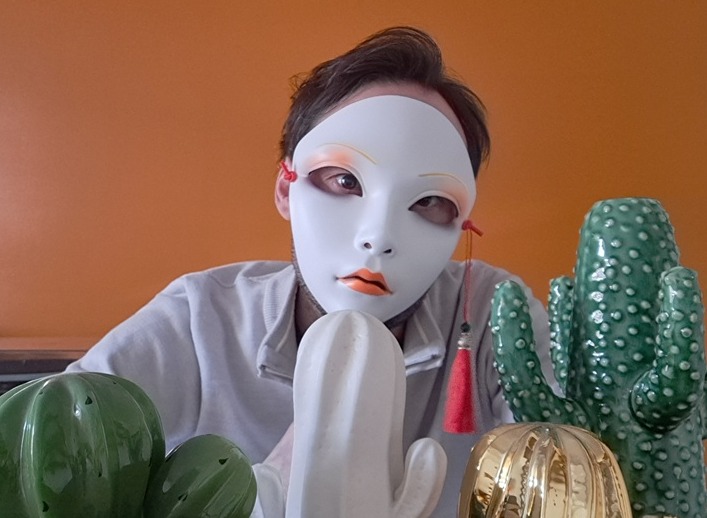Crohn’s disease: “I went through a total proctocolectomy… and it’s not over yet.”
Published 20 Aug 2025 • Updated 21 Aug 2025 • By Candice Salomé
Living with Crohn’s disease means facing the unexpected every day. A Carenity member (who wishes to remain anonymous) had to learn to cope with unpredictable flares, ineffective treatments, and a major surgery.
Today, after the complete removal of their colon and rectum, they tell us about their journey, with both humor and honesty.

Hello, and thank you so much for agreeing to share your story with Carenity.
First of all, could you tell us a bit more about yourself?
Hello, with pleasure, and thank you for the invitation. I apologize for staying anonymous, though at the same time, I suppose it’s not every day you hear the story of a mysterious masked patient…

So, what can I tell you about myself? After many years living in the city, I now live in the countryside with my partner, my cat, and Crohn’s disease, which I’ve had for about ten years. I like desserts in general, reading, writing, and trying to guess what certain clouds might look like.
You have Crohn’s disease. Could you tell us more about this condition?
Crohn’s disease is a chronic inflammatory illness that can affect the entire digestive system (from the mouth all the way down to… well, you can imagine). Like many chronic illnesses, it comes in flares, sometimes mild, sometimes severe, most often showing up as abdominal pain and diarrhoea. To put it very simply, it’s a bit like having gastroenteritis permanently, 24 hours a day, even on Christmas Day.
You’ve been living with it for 12 years. How did the disease first show up in your life? What were your first symptoms?
At the very beginning, it started off like gastroenteritis. After two weeks without improvement, I had to go through the ritual exam: a colonoscopy. When I woke up, they handed the results to me and announced that it’s called Crohn’s! From then on, the rest of your life is about, if not trying to love it, at least learning to live with it and trying to understand it.
Over all these years, what treatments have you tried? How many have you gone through, and how effective were they?
I’ve tried about 7 or 8 different treatments, including one that gifted me with another condition: primary sclerosing cholangitis (a liver disease that, for now, is quiet and not too invasive). My current treatment is injections that I give myself every two weeks. Sometimes it takes a long time to find the treatment that works for your body. Sometimes you never find it. Sometimes it works for a while but loses effectiveness. There are no rules and, without wanting to scare anyone, you never really feel like you’re out of the woods. It’s more like you’re sitting at the table most of the year, and the bartender enjoys sending another round every so often.
Over these 12 years, your colon has taken quite a beating. What decision did your doctors make recently, and how did the surgery go?
Indeed, all these years caused a lot of damage to my colon, so the medical team decided on a total proctocolectomy (complete removal of the colon and rectum, quite something). The surgery went well. They gave me a stoma, which I had to keep until everything healed before reconnecting things.
In January 2025, your stoma was removed. Why, and do you feel better now? Have your Crohn’s symptoms improved?
They removed my stoma at the end of January once the healing looked good and my transit could start working again, with my small intestine now taking over the functions of my late colon.
We won’t turn this into a therapy session, but I can’t say I feel much better yet, because now I have to learn to handle a new kind of transit that’s still very unpredictable. It sometimes reminds me of the worst days of Crohn’s flares: constant trips to the bathroom, day and night, with all the collateral damage that brings. Things should eventually stabilize, and while it will never be the same as for a healthy person, hopefully it will become less temperamental and more manageable.
What impact does Crohn’s disease have on your personal and professional life?
It has a huge impact on personal life… During flares, for example, you often end up stuck at home. You build a mental map of every public toilet in places you’ve been. You live with constant uncertainty. When the flare calms down, you can live more normally, but the mental scars remain. For me, to give an example, even when I’m doing very well, I can’t help but scan for toilets everywhere I go, just to be reassured or prepared for an unpredictable disaster.
As for work, I’m currently on sick leave after my surgery. Otherwise, I’ve been working at the same place for several years, and things go well; my colleagues and boss know about my illness and are supportive, which is greatly appreciated. As for my superhero work, well… I still have the mask, but I’ll admit that activity is on pause for now.
Where do things stand for you today?
Today, I’m slowly recovering from my second surgery to restore continuity. It’s still tough, but you have to be patient and determined. That’s easier said than done, and sometimes you break down. It feels like a yo-yo: some days aren’t too bad, others are much harder to handle. To answer with an image, it’s as if I’m lost in the middle of a map, standing right at the spot marked “You are here.” So, there’s still quite a journey ahead of me.
All I want in the future is to get better, live as normally as possible, take long walks through wheat fields with my cat, and eat coffee éclairs.
A final word?
A big thanks to our anonymous member for trusting us with their story.
If you found this article helpful, feel free to give it a “Like” and share your thoughts and questions with the community in the comments below!
Take care!

 Facebook
Facebook Twitter
Twitter


